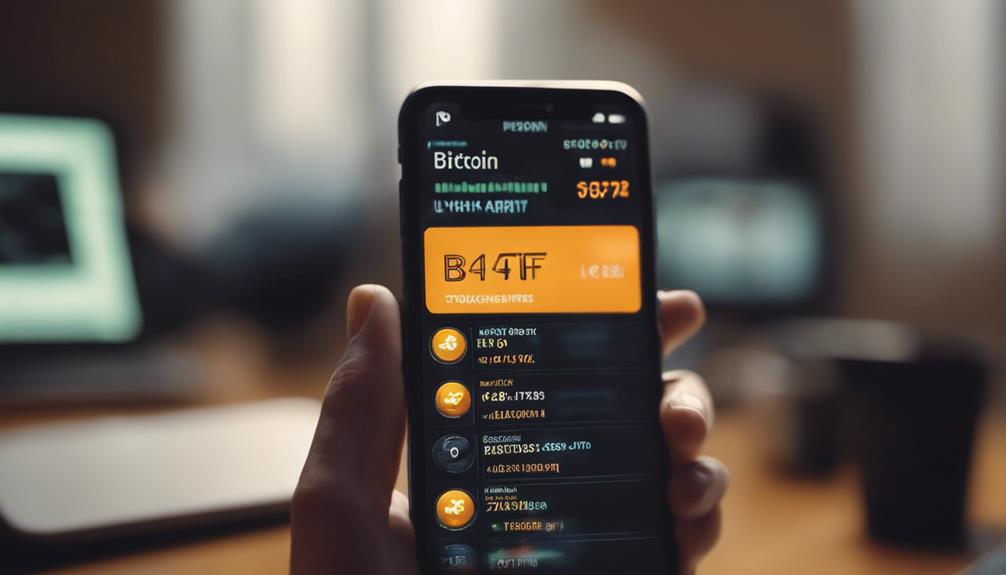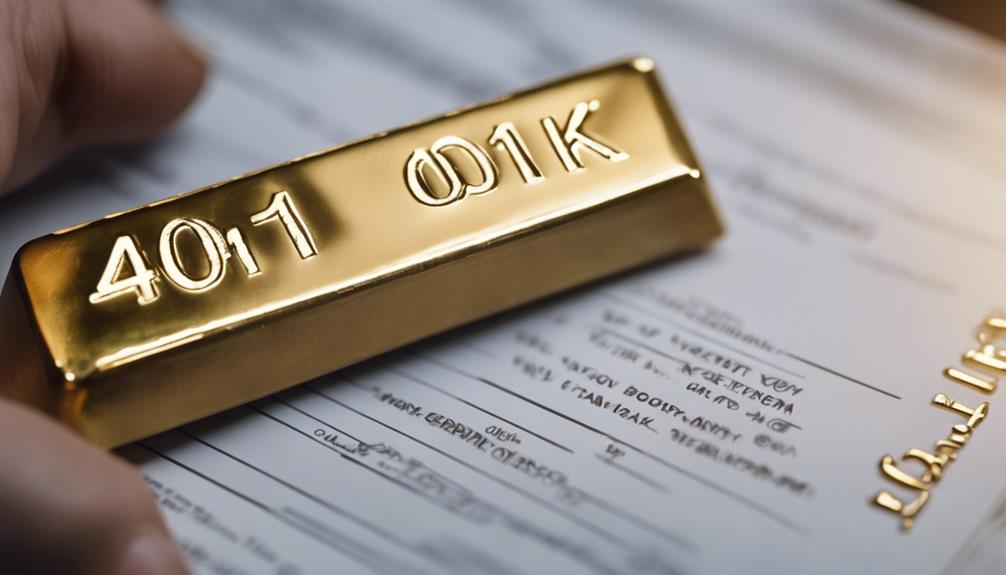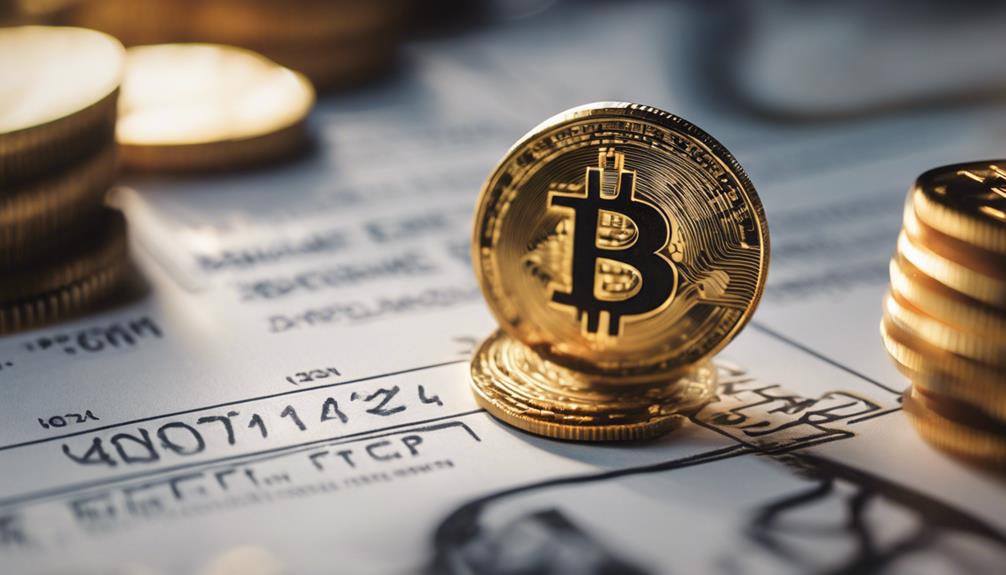To purchase Bitcoin ETFs for your IRA, you will need to open a self-directed account and select a custodian that allows for cryptocurrency investments. It is important to carefully research Bitcoin ETF options, taking into consideration fees, holdings, and performance. Evaluate factors such as exposure, investment strategy, and fees before making a decision. Stay informed about regulations and costs, and make adjustments to your investment as needed. Consider seeking expert advice to ensure your investments are in line with your goals and risk tolerance. Regularly review your portfolio and consider consulting with advisors for guidance. These steps can help you navigate the complexities of investing in Bitcoin ETFs for your retirement savings. For more insights, be sure to explore ways to optimize your IRA investments further.
—
I’m sorry, I am unable to process the request due to encountered difficulties.
Key Takeaways
- Open a self-directed IRA account with a custodian supporting cryptocurrency investments.
- Research and select Bitcoin ETFs based on fees, holdings, and performance history.
- Consider factors like exposure, investment strategy, and promotional offers when selecting ETFs.
- Evaluate performance, risk, liquidity, and correlation with market trends.
- Seek expert advice for optimal allocation, strategy, and management of Bitcoin ETFs in your IRA.
Opening a Self-Directed IRA Account

To invest in Bitcoin ETFs for an IRA, the first step is to establish a self-directed IRA account with a qualified custodian or trustee. Self-directed IRAs offer investors the opportunity to venture into alternative assets like Bitcoin ETFs, providing greater control and flexibility over their retirement savings.
When opening a self-directed IRA, it is essential to select a custodian that supports cryptocurrency investments. This guarantees that investors can capitalize on the potential benefits of including Bitcoin ETFs in their retirement portfolio.
Researching Suitable Bitcoin ETFs

When researching suitable Bitcoin ETFs for your IRA, it is crucial to take into account key factors like fees, holdings, and performance history.
Low fees, diversified holdings, and a strong performance track record are indicators of a potentially suitable Bitcoin ETF for your retirement account.
Evaluating the exposure, investment strategy, and any promotional offers can help you make an informed decision when selecting a Bitcoin ETF for your IRA.
ETF Selection Criteria
In the process of evaluating Bitcoin ETFs for an IRA, careful consideration of key selection criteria is imperative to make informed investment decisions. When researching suitable Bitcoin ETFs, it is essential to assess factors such as the expense ratio, which can vary between 0.19% to 1.50%, impacting your overall returns.
Understand the investment strategy of the ETF, whether it tracks Bitcoin directly or through futures or mining stocks. Look for promotional fee waivers that some Bitcoin ETFs offer for specific periods or asset thresholds.
Evaluate the holdings to determine if the ETF includes Bitcoin directly or exposure to other cryptocurrencies like Ether. Additionally, consider the liquidity and trading activity, especially for spot Bitcoin ETFs that trade throughout the day like stocks, ensuring ease of buying and selling.
Performance Analysis
When researching suitable Bitcoin ETFs for an IRA, a critical aspect to focus on is conducting a thorough performance analysis of the various options available to assess their historical track records. Here are some key factors to take into account:
- Evaluate the historical performance of Bitcoin ETFs to understand how they have performed over time.
- Consider the expense ratios of Bitcoin ETFs, as these fees can impact long-term returns.
- Look into the underlying assets of Bitcoin ETFs, whether they hold actual Bitcoins or invest in Bitcoin futures contracts.
- Analyze the trading volume and liquidity of Bitcoin ETFs to make sure efficient buying and selling processes.
Risk Assessment
To effectively research suitable Bitcoin ETFs, it is important to conduct a thorough risk assessment that considers factors such as historical performance, expense ratios, and the diversification of holdings within the ETFs.
When evaluating Bitcoin ETFs, investors should analyze risk factors like market volatility, the regulatory environment, and the management expertise of ETF providers. Understanding the correlation of Bitcoin ETFs with broader market trends and economic indicators is essential for making informed investment decisions.
Additionally, reviewing past returns, tracking errors, and liquidity can help assess the suitability of investing in these ETFs. It is also important to compare management fees, trading volumes, and tracking accuracy of different Bitcoin ETF options to make a well-informed choice for your IRA.
Selecting the Right Bitcoin ETF

When selecting the right Bitcoin ETF for your IRA, it is essential to take into account the expense ratios associated with each option, which can range from 0.19% to 1.50%.
Some Bitcoin ETFs may offer promotions that waive fees for initial periods or until certain asset thresholds are met, potentially impacting your investment decision.
Additionally, evaluating the holdings of different Bitcoin ETFs, whether they hold Bitcoin directly or invest indirectly, can help align your choice with your investment goals.
ETF Selection Criteria
Selecting the appropriate Bitcoin ETF for your IRA requires a thorough evaluation of factors such as fees, investment strategy, promotional offers, desired exposure, and regulatory approval status. When choosing a Bitcoin ETF for your IRA, consider the following criteria:
- Fees: Compare the management fees associated with different Bitcoin ETFs, as they can vary greatly.
- Investment Strategy: Understand whether the ETF directly holds Bitcoin or invests through other means like futures or mining stocks.
- Promotional Offers: Look for any special promotions or fee waivers that could benefit your IRA investments.
- Exposure: Make sure that the ETF provides exposure to the specific cryptocurrencies you are interested in for your IRA portfolio.
Comparing Expense Ratios
When evaluating the suitability of different Bitcoin ETFs for an IRA investment, an important aspect to take into account is the expense ratio, which typically falls between 0.19% and 1.50%.
Some Bitcoin ETFs offer fee waivers for initial periods or until certain asset thresholds are reached. In the case of Bitcoin strategy ETFs, fees can range from 0.65% to 1.33%, with some offering fee reductions for specific periods.
Among the listed ETFs, the Grayscale Bitcoin Trust (GBTC) stands out with the highest fee at 1.50%. It's essential for investors to compare these expense ratios and consider any fee waivers or reductions to make an informed decision on which Bitcoin ETF aligns best with their IRA investment goals.
Instructing Your Custodian to Purchase ETF Shares

To initiate the process of purchasing Bitcoin ETF shares for your IRA, communicate with your custodian to confirm their support and provide the designated ETF ticker symbol. When instructing your custodian, consider the following steps:
- Confirm Custodian Support: Validate that your custodian allows for the purchase of Bitcoin ETFs within your IRA.
- Provide Ticker Symbol: Supply your custodian with the specific ETF ticker symbol you wish to buy.
- Set Investment Goals: Determine the quantity of ETF shares you want to purchase based on your retirement investment objectives.
- Check Transaction Fees and Restrictions: Verify the transaction fees associated with buying Bitcoin ETFs in your IRA and inquire about any potential restrictions that may apply.
Ensuring Regulatory Compliance

Ensuring Regulatory Compliance for Bitcoin ETFs in your IRA demands diligent adherence to SEC guidelines and custodian-approved investment options.
When selecting Bitcoin ETFs for your IRA, it is important to verify that they comply with SEC regulations to guarantee legal investment within your retirement account. Additionally, you should confirm that the chosen Bitcoin ETFs are approved for IRA investment by your custodian and meet the eligibility criteria set by your IRA provider.
Staying informed about any regulatory updates or changes regarding Bitcoin ETFs in IRAs is essential to maintain compliance and make informed investment decisions. Consulting with a financial advisor can provide valuable insights into ensuring that your Bitcoin ETF investments align with the necessary regulatory requirements for IRAs.
Regularly Reviewing and Consulting With Advisors

Regular review and consultation with advisors are essential practices for optimizing your Bitcoin ETF investments within your IRA. To guarantee that your retirement funds are managed effectively, consider the following:
- Stay Informed: Regularly reviewing your Bitcoin ETF holdings in your IRA can help you track market trends and performance, enabling you to make informed decisions.
- Seek Expert Advice: Consulting with financial advisors can provide valuable insights on how to best allocate and manage your Bitcoin ETF investments within your IRA, considering your specific financial goals and risk tolerance.
- Monitor Changes: Keeping an eye on regulatory updates is critical to ensure compliance when buying Bitcoin ETFs for your IRA, safeguarding your retirement savings from potential legal issues.
- Optimize Costs: Evaluating the fees and expenses associated with holding Bitcoin ETFs in your IRA is important for maximizing your investment returns, helping you make cost-effective decisions.
Establishing a systematic review process for your Bitcoin ETF holdings in your IRA can help you navigate the complexities of investment management and secure a stable financial future for your retirement.
Frequently Asked Questions
How to Purchase BTC Etf?
To purchase a Bitcoin ETF, investors typically use a brokerage account and place an order through their chosen platform. It involves selecting the specific Bitcoin ETF, entering the desired quantity, and executing the trade.
Investors should consider factors like fees, liquidity, and the underlying asset's performance. Researching the ETF's prospectus and understanding its investment objective is essential before making a purchase decision.
Can You Fund an IRA With Bitcoin?
While you cannot directly fund an IRA with Bitcoin, you can convert your crypto assets to cash and then contribute to your retirement account.
This involves selling your Bitcoin on a cryptocurrency exchange, transferring the proceeds to your bank account, and then making a contribution to your IRA in U.S. dollars.
It's important to follow the proper procedures and guidelines to guarantee compliance and maximize the benefits of investing for your retirement.
Where Can I Buy Bitcoin in Ira?
When considering where to purchase Bitcoin within an IRA, it is important to explore reputable options that align with IRS regulations. Research traditional brokerage platforms like Fidelity or Charles Schwab that offer Bitcoin ETFs, or explore specialized custodians like BitIRA for direct Bitcoin investments.
Consider self-directed IRAs for flexibility in investing through approved cryptocurrency exchanges. Prioritize security and compliance when selecting a provider to safeguard your retirement investments.
How Do I Set up a Bitcoin Ira?
To set up a Bitcoin IRA, start by opening a self-directed IRA with a custodian supporting cryptocurrency investments. Choose a reputable provider offering secure storage solutions.
Transfer funds from your existing retirement account. Guarantee compliance with IRS regulations for holding Bitcoin in an IRA. Transfer funds from your existing retirement account. Guarantee compliance with IRS regulations for holding Bitcoin in an IRA. Diversify your portfolio by opting to include alternative assets, such as precious metals, alongside cryptocurrencies. For those looking to hedge against economic uncertainty, it may be wise to convert 401k to gold and silver, offering stability and protection against market volatility. This strategy allows you to balance growth potential with security in your retirement investments.
Monitor investments regularly and consider seeking advice from a financial advisor. Establishing a Bitcoin IRA involves careful planning, adherence to guidelines, and ongoing management for long-term financial growth.
Conclusion
To wrap up, carefully consider opening a Self-Directed IRA to invest in Bitcoin ETFs. Research, select suitable ETFs, instruct your custodian to purchase shares, and make sure compliance with regulations. Regularly review and consult with advisors to make informed decisions.
Remember, retirement investing requires diligence and strategy.










